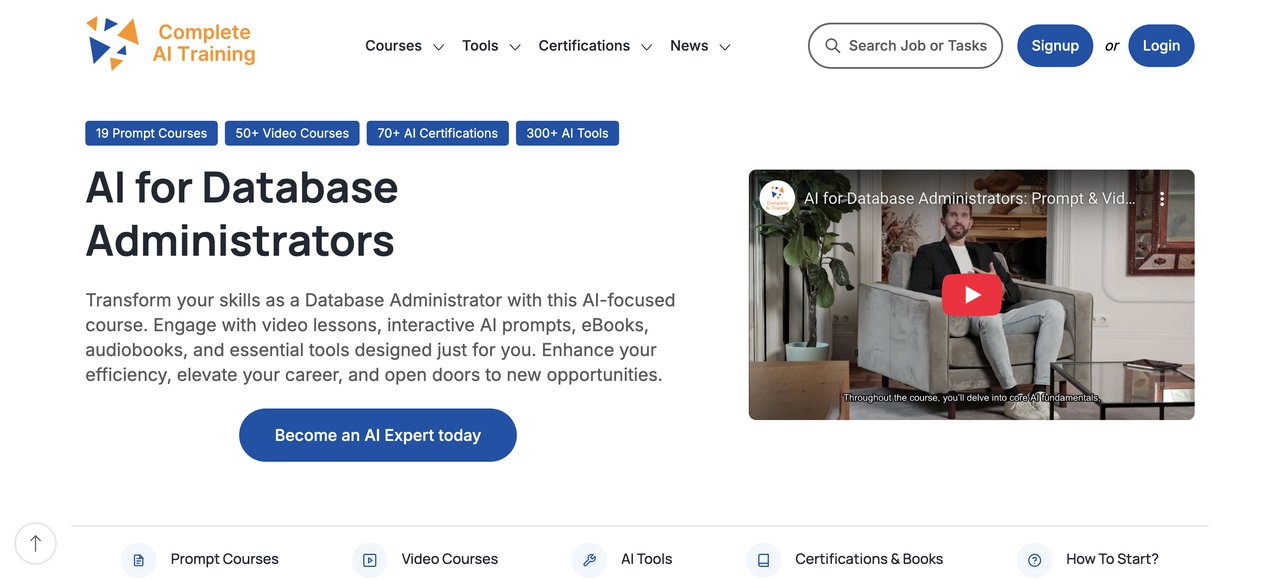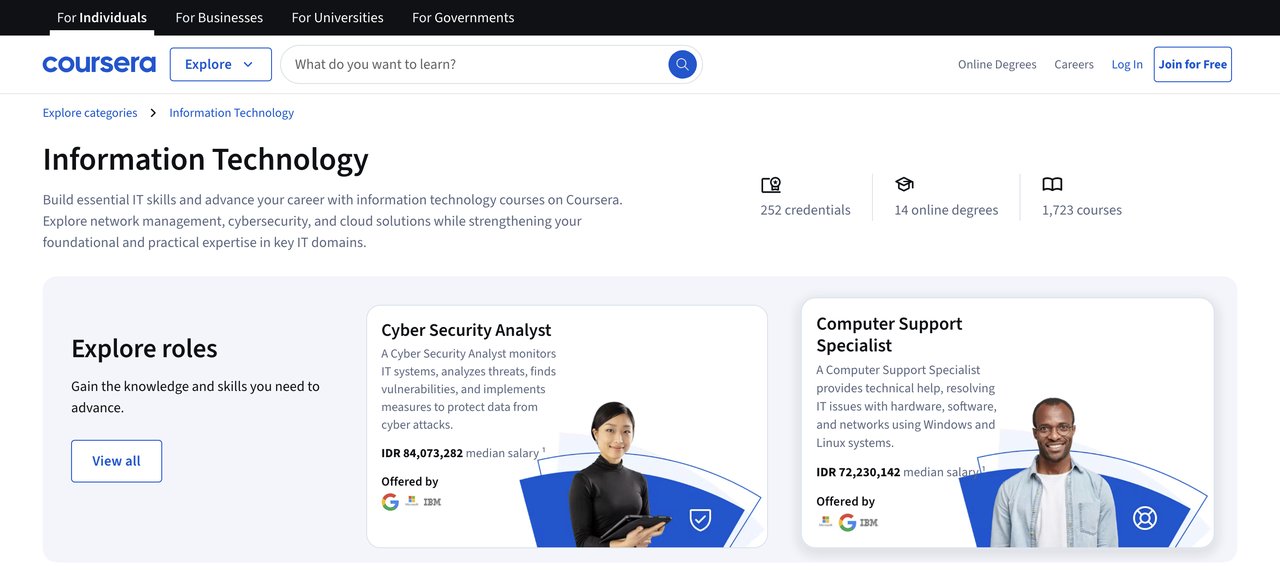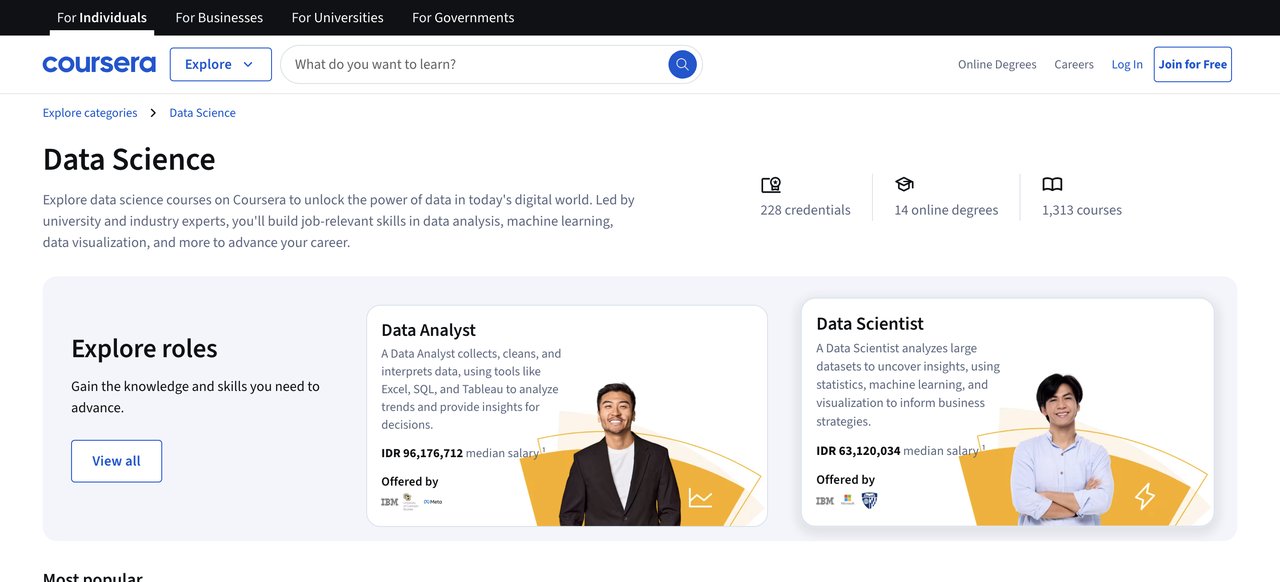8 Top AI Courses for Database Administrators in 2025
Discover the best AI courses tailored for database administrators in 2025. Enhance your skills with cutting-edge programs designed to integrate AI into database management, boosting efficiency, security, and performance. Stay ahead in the evolving tech landscape!

The rapid advancement of artificial intelligence (AI) is reshaping industries across the globe, and database administration is no exception. As AI technologies continue to evolve, the demand for skilled professionals who can leverage these tools effectively is skyrocketing. For database administrators, upskilling in AI is no longer just an option—it's a necessity to stay competitive in the job market. With AI's potential to automate routine tasks, enhance decision-making processes, and personalize data management strategies, database administrators who embrace these changes can significantly impact their organization's success and ensure their career longevity.
Why AI matters for Database Administrators today
AI has become a crucial component for database administrators as organizations increasingly rely on data-driven insights to make strategic decisions. According to recent statistics, 69% of businesses are now utilizing AI technologies, highlighting the importance of integrating AI skills into database management practices. This article aims to guide database administrators in identifying top AI courses that will equip them with the necessary skills to thrive in this evolving landscape. By exploring comprehensive training options, professionals can better position themselves to meet industry demands and capitalize on emerging opportunities.
The Growing Role of AI in Database Administrators
The integration of AI into database administration is transforming various aspects of the field. Automation of routine tasks, such as data entry and maintenance, allows professionals to focus on more strategic initiatives. AI-driven decision-making tools enable database administrators to analyze vast amounts of data quickly, leading to more informed business decisions. Furthermore, personalization features powered by AI can help tailor data management solutions to meet specific organizational needs. These applications demonstrate how AI is reshaping tasks and workflows, offering database administrators the chance to enhance their efficiency and effectiveness.
Benefits of becoming an AI expert in Database Administrators
For database administrators, gaining expertise in AI offers numerous benefits. Enhanced efficiency through AI-driven automation means less time spent on mundane tasks and more focus on strategic planning and innovation. Additionally, the ability to leverage AI for predictive analytics and proactive data management can lead to improved data accuracy and reliability. Professionals who develop AI skills are likely to see increased job security and opportunities for career advancement as organizations continue to seek out individuals who can navigate the complexities of modern data environments. Embracing AI education and training enables database administrators to become indispensable assets in their organizations.
This article will compare eight AI courses tailored specifically for database administrators, including the highly regarded CompleteAI Training. Each course offers unique advantages, helping professionals decide which path best suits their career goals and learning preferences. By exploring these options, database administrators can embark on a journey of continuous learning and professional growth in the AI-driven world of data management.

Comparison: All AI Courses for Database Administrators (Updated Q2' 2025)
| Course Name | Provider | Price | Key Topics | Pros | Cons | Best For |
|---|---|---|---|---|---|---|
| AI for Database Administrators | CompleteAI Training | $29/month (monthly), $8.25/month (annually) | Video courses, Certifications, AI tools, Industry news | Highest rating, Extensive courses, Daily updates, Affordable pricing | Subscription based | Database Administrators professionals |
| IBM Relational Database Administration (DBA) | IBM via Coursera | $39-$79/month | DBA skills, Performance tuning, Security | Comprehensive coverage, Focus on security | Requires prior knowledge | General learners |
| Meta Database Engineer Professional Certificate | Meta via Coursera | $39-$79/month | MySQL, ETL, SQL, Unix commands | Beginner-friendly, Practical tools | Longer duration | General learners |
| IBM Data Engineering Professional Certificate | IBM via Coursera | $39-$79/month | NoSQL, Data warehousing, Generative AI | Broad skills, Modern tools | Broad scope | General learners |
| IBM Relational Database Administrator Professional Certificate | IBM via Coursera | $39-$79/month | Data engineering, SQL, Generative AI | Comprehensive skills, High ratings | Intermediate level | General learners |
| Packt Oracle Database Administration from Zero to Hero | Packt via Coursera | $39-$79/month | Oracle DBA, Cloud environments | Oracle-specific skills | Less generalizable | General learners |
| University of Colorado Boulder - Databases for Data Scientists Specialization | University of Colorado Boulder via Coursera | $39-$79/month | Database design, SQL, NoSQL | Focus on data science | Data science oriented | General learners |
| IBM Introduction to Relational Databases (RDBMS) | IBM via Coursera | $39-$79/month | Database design, SQL, MySQL | Short duration | Limited depth | General learners |
Understanding AI Training for Database Administrators Professionals
With the rise of artificial intelligence (AI), Database Administrators (DBAs) are finding new ways to enhance their skills and stay competitive in the industry. AI courses tailored for DBAs can provide in-depth knowledge about AI tools and techniques that can improve database management, security, and performance. This article will compare several AI courses available to DBAs, focusing on aspects such as cost, content, target audience, and more.
Course 1: CompleteAI Training

Complete AI Training offers a comprehensive suite of over 100 video courses and certifications specifically designed for Database Administrators. This subscription-based service provides both monthly and annual payment options, making it highly accessible. Subscribers gain access to extensive AI education resources, daily updates on AI tools, and curated industry news relevant to DBAs.
Key Topics Covered: AI tools for database management, certifications for AI proficiency, industry news updates.
Target Audience and Skill Level Requirements: Designed for Database Administrators looking to integrate AI into their workflow, suitable for all skill levels.
Pros:
- Extensive range of AI courses tailored for DBAs
- Daily updates on AI tools and industry news
- Affordable pricing, especially with annual billing
Cons:
- Requires ongoing subscription for continuous learning
This course is ideal for DBAs who want a complete and regularly updated resource for AI training.
Explore Complete AI Training for Database Administrators
Course 2: IBM Relational Database Administration (DBA) by IBM via Coursera

This intermediate-level course focuses on essential DBA skills for relational databases such as IBM DB2, MySQL, and PostgreSQL. It covers administration, management, architecture, and performance tuning, as well as disaster recovery and security measures.
Key Topics Covered: Database performance tuning, security, system monitoring, user account management.
Target Audience and Skill Level Requirements: Suitable for intermediate learners with some prior database knowledge.
Pros:
- Comprehensive coverage of DBA skills
- Focus on performance tuning and security
Cons:
- Requires prior database knowledge
This course is best suited for DBAs with some experience who wish to deepen their understanding of relational database administration.
Explore IBM Relational Database Administration
Course 3: Meta Database Engineer Professional Certificate by Meta via Coursera

This beginner-level professional certificate covers MySQL, database design, ETL processes, and SQL. It introduces practical tools like Unix commands and Git, making it an excellent choice for those new to database development and administration.
Key Topics Covered: MySQL, database design, version control, ETL, data modeling.
Target Audience and Skill Level Requirements: Designed for beginners who want to start a career in database engineering.
Pros:
- Beginner-friendly with professional certificate
- Practical focus on tools like Git and Unix commands
Cons:
- Longer duration (3-6 months)
This course is ideal for those new to the field, seeking a comprehensive introduction to database engineering.
Explore Meta Database Engineer Professional Certificate
Course 4: IBM Data Engineering Professional Certificate by IBM via Coursera

This beginner-level certificate covers a broad range of topics, including NoSQL, data warehousing, ETL, and modern tools like Apache Hadoop and Spark. It also introduces generative AI concepts relevant to database management.
Key Topics Covered: NoSQL, ETL processes, data warehousing, Apache Airflow, generative AI.
Target Audience and Skill Level Requirements: Suitable for beginners interested in both data engineering and database administration.
Pros:
- Broad data engineering skills including database administration
- Integration of modern tools and generative AI
Cons:
- Broad scope may require focus for DBAs
Ideal for beginners who want a wide-ranging introduction to data engineering and database administration.
Explore IBM Data Engineering Professional Certificate
Course 5: IBM Relational Database Administrator Professional Certificate by IBM via Coursera

This intermediate-level certificate provides a comprehensive look at database administration and data engineering, including data warehousing, ETL, and security. It incorporates generative AI applications to enhance database management skills.
Key Topics Covered: Data engineering, ETL, database security, generative AI, SQL.
Target Audience and Skill Level Requirements: Best for intermediate learners with prior database knowledge.
Pros:
- Comprehensive skills for DBA and data engineering
- Includes generative AI applications
Cons:
- Intermediate level requires prior knowledge
This course is most beneficial for experienced DBAs looking to expand their skillset into data engineering.
Explore IBM Relational Database Administrator Professional Certificate
Course 6: Packt Oracle Database Administration from Zero to Hero by Packt via Coursera

This intermediate specialization focuses on Oracle database administration, covering topics like patch management, PL/SQL, and cloud environments. It provides detailed insights into Oracle-specific DBA skills.
Key Topics Covered: Oracle administration, cloud environments, patch management, performance tuning.
Target Audience and Skill Level Requirements: Suitable for intermediate learners focusing on Oracle databases.
Pros:
- Oracle-specific DBA skills
- Covers cloud and multi-tenant environments
Cons:
- Oracle-specific, less applicable to other DBMS
Best for DBAs specializing in Oracle databases, seeking practical and detailed training.
Explore Packt Oracle Database Administration
Course 7: University of Colorado Boulder - Databases for Data Scientists Specialization by University of Colorado Boulder via Coursera

This beginner specialization is tailored for data scientists but covers core DBA skills such as database design, SQL, and NoSQL. It provides a crossover between data science and database administration.
Key Topics Covered: SQL, NoSQL, data warehousing, database theory, administration.
Target Audience and Skill Level Requirements: Designed for beginners interested in data science and database administration.
Pros:
- Focus on data science with database skills
- Covers both relational and NoSQL databases
Cons:
- More data science-oriented than pure DBA
Ideal for DBAs looking to explore data science applications within their field.
Explore University of Colorado Boulder Databases for Data Scientists
Course 8: IBM Introduction to Relational Databases (RDBMS) by IBM via Coursera

This beginner-level course provides foundational knowledge of RDBMS, covering database design, SQL, and command-line management. It is designed to give newcomers a solid grounding in relational databases.
Key Topics Covered: Database design, MySQL, IBM DB2, PostgreSQL, SQL.
Target Audience and Skill Level Requirements: Perfect for beginners without prior database experience.
Pros:
- Short duration (1-4 weeks)
- Good foundational RDBMS knowledge
Cons:
- Limited depth for advanced DBA skills
This course is excellent for those new to databases, providing a quick and effective introduction.
Explore IBM Introduction to Relational Databases
Overall Recommendations for Database Administrators
When selecting an AI course, Database Administrators should consider their current skill level, specific interests, and long-term career goals. For comprehensive, continuously updated resources, CompleteAI Training offers a robust option with its subscription model. For those focused on relational databases, the IBM Relational Database Administration course provides a solid foundation. Beginners might benefit most from the Meta Database Engineer Professional Certificate for an introduction to practical tools and database development. Ultimately, the best choice depends on the individual's needs and professional aspirations.




